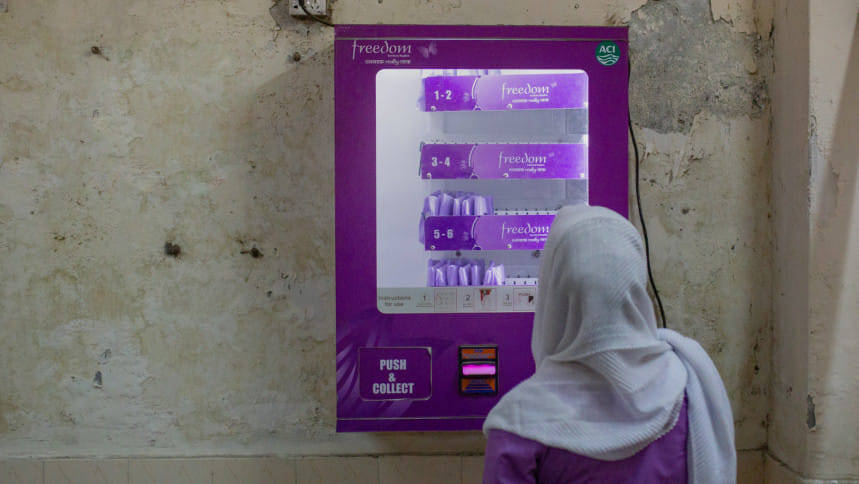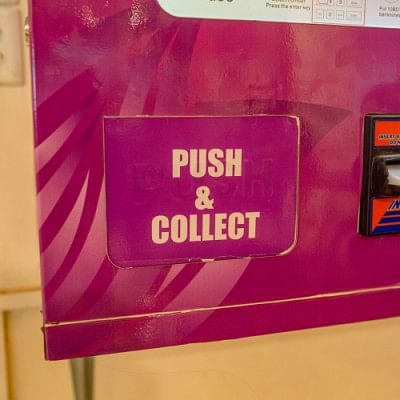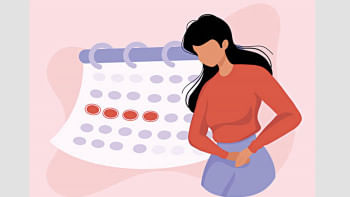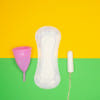Availability of menstrual products in educational institutions

It is an unfortunate truth that conversations around menstruation are considered taboo in our country. From the very first time that a girl gets her period, she is made to believe by her family members that menstruation is something to be kept under the wraps.
Faced with the air of discomfort around this topic, these girls become conditioned to treat their periods with utmost secrecy, resulting in them feeling rather ashamed of their periods. Due to the stigma surrounding menstruation, as well as their ingrained feelings of shame, many females find it embarrassing to talk about menstrual products. It isn't uncommon for women to have never bought sanitary napkins for themselves from a pharmacy well into their adulthoods, nor is it rare for them to be embarrassed to ask someone else to buy menstrual products for them.
Educational institutions teach students of all ages and they are filled with educators who should be aware of the problems female students face regarding menstruation. They should be at the forefront of the fight against the stigma surrounding periods. However, most institutions are still caught in back-dated ways to properly address menstrual issues. Consequently, if students get their periods unexpectedly while at their education premises, they lack the proper support should they require aid.

Kazi Zuairia, a student at Viqarunnisa Noon School and College, expresses disappointment at how her school handles menstrual products. "Our school tried taking some steps to make pads available a few months back. However, the vending machines they introduced broke within a week and haven't been fixed or refilled since," she says. "Furthermore, they hung some dispensers in certain washrooms but they never had any pads installed in them."
Speaking on the attitude of teachers when students ask them for help, she says, "They tell us to go to the washrooms and fix it ourselves so most of us don't bother asking them anymore but turn to our friends and hope they have a pad."
Most institutions have sanitary napkins in the nurse's office, which is usually located some ways away from bathrooms, where students generally go to when they are faced with sudden periods. Having to walk the distance from the bathroom to the nurse's office, especially when they might have stains on their clothes, is obviously less than ideal.
The scene isn't particularly different in female-only madrasas. A female student at a madrasa in the southern part of Keraniganj, who asked to remain anonymous, says, "The madrasa provides no access to feminine hygiene products, and we have to buy our own from nearby shops."
The issue here is that students are taught to feel shame when asking for sanitary pads at stores. Being a female-only madrasa without providing menstruation supplies is concerning, as most students enter madrasas at an early age and experience puberty while enrolled.
One solution would be to introduce vending machines to dispense sanitary napkins. When the sanitary napkin vending machines were introduced at the University of Dhaka, they were met with nothing but applause and appreciation. But the current situation renders the former nothing more than the clever marketing of a sanitary product manufacturer. It's simpler to just run into a pharmacy rather than using one of the broken vending machines to get a pad.
Mishkat Mahiuddin, an undergraduate student at the University of Dhaka, paints a picture that almost every female student attending a public university can relate to when she says, "Before the pandemic, we always had access to sanitary napkins, but now we do not. We have classes at Mokarram, so the halls are fairly far away. Dhaka Medical College (DMC) is the closest location to get pads. However, we must return to the department's restroom to wear the pads. There is a vending machine in the math building, although it's faulty, as are all of our hall's vending machines. I was only able to pull out a pad once."
Jim Ilyas, a student of Jahangirnagar University, adds to the argument. She says, "We have vending machines in our halls and departments. They may be present in every hall, but not in sufficient numbers. The vending machines do not function properly, and if one crashes, it is never repaired. There is no access to pads at TSC, where the majority of clubs and events are hosted. Save for a select handful, the conditions of the washrooms are appalling."
Menstruation is a monthly occurrence for women, and having little to no access to pads when needed is a major cause for concern. Moreover, the conditions of the restrooms at these institutions are deplorable, resulting in female students frequently refusing to use washrooms conveniently located near them in favour of those located further away.
Upon interviewing private university students, it is quite apparent that the availability of feminine hygiene products is not satisfactory there either. Amreeta Lethe Chowdhury, an undergraduate student at the University of Liberal Arts Bangladesh (ULAB), says, "They installed a dispenser in the women's common room. It's not always convenient because our campus is huge, and this common room is quite far away from the actual classrooms. Besides, the machine doesn't always work."
"We had to appeal to the Vice Chancellor to get the vending machine installed. But there are many difficulties in using it and, resultantly, we still have to carry our own pads. It would have been much easier to have a few packets in each washroom," states Nahian Jamal Joyeeta, another undergraduate student at ULAB.
At North South University (NSU) and BRAC University (BRACU), the situation isn't any better. Only one bathroom at NSU has a machine that dispenses pads, and that is connected to the female-only lounge. Bathrooms with available menstrual products in BRACU are few and far between.
Going about looking for a pad while bleeding and experiencing cramps directly burdens the students rather than the institutions. The administrative body should assume responsibility for providing students with menstrual products instead of leaving them to handle the situation on their own.
The situation gets more complicated for students with disabilities, who often have to battle debilitating cramps and bleeding, while searching for menstrual products or even an accessible bathroom. Most public buildings, including universities, often lack the necessary infrastructure for accessibility, such as wheelchair ramps or handles for support.
It is critical to conduct a comprehensive assessment in order to determine the number of female students and their needs. For a large number of students, installing a few vending machines or designating only one washroom with feminine hygiene products is insufficient. This approach ignores the actual needs of the female student population, which can result in uncomfortable or unsanitary conditions. The authorities should also make sure whether the facilities already available to the students are functioning properly or not.
Institutions should make informed decisions about where and how many feminine hygiene products and accessible washrooms are needed. By taking this approach, educational institutions can foster a supportive and inclusive environment that prioritises their students' health and well-being.
Azra Humayra is a part-time roach squasher and a full-time trash television connoisseur. Send her show recommendations at: [email protected]
Zaima is a struggling student, a failed guitarist and a poet in need of better poetic ideas. Send her your sympathies at [email protected]

 For all latest news, follow The Daily Star's Google News channel.
For all latest news, follow The Daily Star's Google News channel. 













Comments